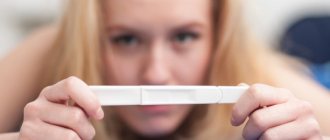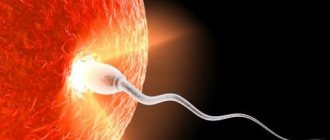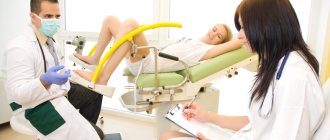It is quite widely believed that it is impossible to get pregnant during menstruation, as well as immediately before or after it. Therefore, some couples do not use any contraceptive methods these days. The final days, when there is practically no discharge, may seem especially attractive.
What is the actual probability of getting pregnant? What do doctors say about having sex during menstruation? Is it possible to get pregnant on the last day of your period? How safe is it for overall health?
Egg during menstruation
Typically, ovulation, or the release of a female reproductive cell ready for fertilization, occurs approximately in the middle of the cycle. Within the next 24 hours after this, she is alive and ready to meet the sperm. If unprotected sexual intercourse occurs on this day or has occurred within the last week, there is a high probability that pregnancy will begin. Then your period will come with a delay of about 2 weeks, and at the time of its onset the embryo will already be about a month old (if you count from fertilization) or 6-7 obstetric weeks.
If pregnancy has not begun, a day after ovulation the female reproductive cell dies. Then, during menstrual flow, its remains and the overgrown layer of the endometrium come out. When the egg is dead, fertilization is impossible.
It is on such data that the statement is based that sex during menstruation is safe and there is no need to use contraception. But you can also hear from some women that they became pregnant at this particular time, for example, on the last day of their period. How could this happen?
Periods during pregnancy?
The girls are worried about whether it might happen. Indeed, in this case it is not clear whether conception has taken place. Doctors' answer to this question is ambiguous.
Bleeding that occurs during pregnancy cannot be called menstruation. Rather, such discharge indicates a threat of miscarriage, detachment of the fertilized egg, rupture of a hematoma, or other pathologies. Despite sound evidence and medical theory, some women report having periods throughout their gestational age. It is impossible to say how reliable these readings are.
It is possible to determine that conception occurred during menstrual bleeding using the usual methods for every woman:
- conduct home testing from the first day of the next delay or 2-3 weeks after intercourse;
- perform an ultrasound examination 30 days after contact;
- measure basal temperature using an anal thermometer for 3 weeks;
- donate blood to determine the amount of human chorionic gonadotropin;
- visit a gynecologist and undergo the prescribed examination.
Summarizing all the information, we can formulate several statements:
- You can get pregnant during menstruation;
- the minimum probability of conception is in the first two days of intense bleeding;
- with a decrease in discharge, the chance of fertilization increases;
- immediately after your period you can become pregnant with a high probability;
- Conception is impossible if sex was anal.
For women with irregular cycles, as well as for women who do not monitor the frequency and duration of their menstruation, the risk of unplanned pregnancy increases significantly.
Many couples practice sex during menstruation without using contraceptives, believing that it is impossible to conceive a child at this time. The last days, when there is practically no discharge, are especially attractive for unprotected sexual intercourse. But let's find out the opinion of medical experts and find out whether it is possible to get pregnant on the last day of your period.
Probability of fertilization
As surprising as it may sound, there is a fairly high probability of egg fertilization as a result of sex during menstruation. And the last day of menstruation is especially dangerous.
This is due to the fact that each girl’s body is individual. Theoretical knowledge about how the reproductive system behaves does not always coincide 100% with what happens in the body. This is especially true for girls who have irregular cycles and hormonal imbalances.
Causes of pregnancy during menstruation
There are many cases when pregnancy occurred after sexual intercourse during menstruation. And there is a logical scientific explanation for this. You just need to take into account some unusual situations that sometimes arise in the body of even a healthy woman. And if she has some kind of hormonal imbalance, she just recently had childbirth or an abortion, this happens quite often. Women who have started menopause are also at risk.
Under what circumstances is there a high probability of a live egg meeting a sperm during menstruation:
- Spontaneous ovulation. This is the name given to the release of a mature germ cell during a period of the menstrual cycle when this should not happen. At the same time, there may also have been ovulation in the middle of the cycle. This may occasionally occur in healthy women. The risk of this phenomenon is especially high if the girl has recently taken hormonal oral contraceptives.
- Hormonal imbalances. If the length of the cycle fluctuates from month to month, discharge begins earlier or later, it is very difficult to calculate the time of ovulation. Often in such cases it is spontaneous, for example, before or during menstrual flow, at the end of the cycle, or is periodically absent altogether. Failures can occur even among those who have never had them, after an abortion, childbirth, or during menopause.
- Short duration of the menstrual cycle. If the cycle is short and the discharge lasts a long time, then even if a mature female reproductive cell is released in the middle of the cycle, there is a chance of becoming pregnant after sex during menstruation, especially on the last day of menstruation. This is due to the fact that sperm, after entering the internal female genital organs, are able to maintain vital activity for up to a week. That is, they can simply “wait” for the moment when pregnancy becomes possible. That is, this will happen not when there was sex, but after a few days or a week.
But the question remains: what time is the most dangerous? Is it possible to get pregnant on the last day of your period? Or is the probability higher at the moment when the discharge is just beginning?
Pregnancy in the last days of menstruation
So, is it possible to get pregnant in the last days of your period? To the question “What is the probability of fertilization at the end of menstruation?” Doctors answer that of the entire period of menstruation, it is easiest to get pregnant in the final days. Often pregnancy occurs on the third or fourth day. The longer the bleeding, the greater the risk.
This is due to the following factors:
- The closer to the end of the discharge, the more likely it is that the sperm will retain its vital activity until ovulation occurs. If menstruation lasts up to a week, and the cycle is short, this will be a natural phenomenon.
- Towards the end, the discharge becomes less. When they are intense, conditions in the vagina make it difficult for the sperm that are trapped there to survive and move. If there is no such interference, the likelihood that it will enter the uterus and fallopian tubes is much higher.
So, the answer to the question of whether it is possible to get pregnant on the last day of your period is obvious. The risk at this time is quite high. It is much higher than in the first days, when there is at least partial mechanical protection in the form of secreted endometrium, blood and mucus. Therefore, if you are not planning to have a child yet, it is imperative to use protection.
Fertilization process
At the moment of ejaculation, millions of sperm are released, and only one is the lucky one to fertilize the egg. Sperm remain viable for 5-7 days, so the chances of getting pregnant increase if sexual intercourse occurs at the moment when ovulation occurs.
https://youtu.be/RUrtn7dl-C4
In short, the fertilization process goes like this:
- a mature egg must meet sperm;
- sperm begin to fight for the right to fertilization, actively making their way through the protective layers of the egg;
- Having penetrated inside, the winner tightly merges with the egg;
- a cortical reaction occurs;
- the losing sperm die.
There are often cases when several embryos develop as a result of fertilization. This is possible from either one or a pair of eggs. Identical twins develop from a multinucleated cell that is fertilized by several sperm at once. Fraternals appear as a result of fertilization of two eggs at once.
Fertilization is possible only if ovulation occurs. It occurs approximately in the middle of the cycle. This is a complex physiological process in which a mature egg is released from the ovary and “travels” through the fallopian tube waiting for a meeting. Its fusion with the sperm occurs within the first day after the start of the “walk”.
Each woman is created individually
To know for sure whether you can get pregnant with the last drops of your period, you need to know the time of ovulation. It is individual for each woman and largely depends on the duration of the menstrual cycle.
Sex during the last days of your period
Doctors answer this question differently. On the one hand, it has been noted that often on these days a woman has a particularly strong sex drive. On the other hand, at this time the genital mucosa is especially sensitive to the effects of various infections, so infection is possible.
- “Casual relationships” or sex with a regular partner is strictly prohibited if he has any of the sexually transmitted diseases.
- If pregnancy is undesirable, you need to protect yourself. It is advisable to use mechanical methods of protection, for example, condoms, as they also protect to some extent from infection.
- During this period, it is especially important to monitor hygiene and cleanliness. This should not be forgotten, even if the intimacy was unplanned.
Be attentive to your health, use knowledge and tools that will help protect it. Then you will not encounter problems or undesirable consequences of rash behavior. And if you decide to plan a pregnancy, it will be easier to do. After all, when the mother is healthy, the child will be strong and resilient, protected from developmental disorders.
Many women of childbearing age trust the calendar method of contraception, according to which conception during menstruation is impossible. But, according to experts, the likelihood of fertilization exists on any day of the cycle. It all depends on the individual characteristics of the body. The risk of pregnancy at the end of menstruation is higher in those women whose time interval between the first days of consecutive menstruation is 21 days.
- Show all
Menstrual cycle
The menstrual cycle is the number of days between the first days of consecutive periods. It consists of 2 phases:
- 1. Follicular.
It starts from the first day of menstruation. This period is characterized by rejection of the endometrium during bleeding and its restoration, as well as the maturation of eggs in the ovaries. Normally, by the middle of the cycle, one of them reaches a diameter of 14 mm, it is called dominant. The mature egg is then released into the fallopian tubes and awaits fertilization. The time of its release is ovulation, the duration of which is a day - maximum two.
2. Luteinova.
During this period, the body of the uterus, thickening, prepares for the implantation of an embryo into it. If conception does not occur, then under the influence of the hormone estrogen, the growth of the endometrium slows down. After the number of days that is half the cycle, the follicular phase begins again with the rejection of the accumulated layer of the endometrium.
The average cycle is 28 days, the normal length is 21-35 days.
According to the physiological characteristics of the female reproductive system, fertilization is possible only in the middle of the cycle, that is, during the period of ovulation. But under the influence of various factors, the latter occurs on different days. It is impossible to find out about the maturation and release of a mature egg without examination.
Probability of conception depending on cycle
The ability to get pregnant on the last day of your period depends on several factors:
The peculiarity of the follicular phase is important - sometimes 2 eggs mature at once. If during ovulation both are released into the abdominal cavity at once and conception does not occur, then the cycle ends with the beginning of menstruation. If one egg is released first, and a few days later the second one is released, then the first one can age, and the second one can become fertilized.
With short
A short cycle lasts 21 days, which is an individual feature and does not require correction. In this case, the probability of conception on the last day of menstruation is high for several reasons:
- 1. Ovulation occurs already on the 7th day of the cycle and later. If menstruation lasted a week, then its end will most likely coincide with the most favorable day for fertilization.
- 2. Sperm remain viable in a woman’s genitals for up to 7 days after unprotected intercourse. Their life expectancy is not affected by bleeding, but is influenced by the genetic characteristics of the man, his state of health and lifestyle. Therefore, if ovulation occurred later than on the 7th day of the cycle, and sex took place in the last days of menstruation, then the egg can probably be fertilized by sperm that entered the genital tract earlier.
With average
The average and optimal menstrual cycle lasts 4 weeks. With it, a mature egg is released into the abdominal cavity on the 13th-14th day. If the duration of menstruation is 6-7 days, then sexual intercourse at the end can lead to pregnancy if the sperm remain viable at the time of ovulation.
If menstruation lasts 3-4 days, then the risk of conceiving a child on the last day is almost zero. Exceptions are hormonal imbalance due to various factors and the resulting earlier ovulation or maturation of 2 eggs with their alternate release into the fallopian tubes.
With a long
A long cycle lasts 34-35 days, with ovulation normally occurring on the 18th-21st day. No matter how long your period lasts, the probability of getting pregnant at the end of it is almost zero if the woman is healthy. It increases if a hormonal imbalance occurs, resulting in early maturation and release of the egg.
Hormonal imbalance can be caused by:
- taking hormonal medications;
- changing oral contraceptives;
- inflammatory diseases of the reproductive system.
If a woman thinks that she became pregnant at the end of her period, then with a high probability fertilization occurred earlier.
With irregular
Experts say that with irregular menstruation, conception is possible any day. The cycle becomes irregular in the following cases:
- during the age periods of puberty and menopause;
- with frequent stress;
- with irregular sex life;
- after operations (surgical therapy, abortion) and installation of an intrauterine device;
- when taking medications: hormonal and antibiotic drugs;
- if inflammatory processes occur in the body.
Two phases make up the female monthly cycle: follicular and luteal. In the interval between them, the process of ovulation occurs - that is, the egg enters the abdominal cavity. Follicles are the precursors of a mature egg. During one cycle, not one, but several cells can mature simultaneously in the ovaries. The largest follicle becomes dominant. All other cells stop growing. Thus, the egg matures from the most viable follicle.
How to prevent conception on your period
According to the rules of personal hygiene, doctors recommend that patients not be sexually active during menstruation, but many girls believe that in the last critical days the bleeding is no longer so heavy, and therefore they allow sex. At the same time, they are sure that the egg has not yet matured for fertilization, and therefore there is no need to use protection. It is these patients who most often experience unplanned pregnancy. If the spouses do not plan to have children, then you should not be so careless about sex on such days; it is better to play it safe by using barrier contraception. You can also protect yourself with drugs from the category of emergency contraception, which include: Postinor and Mifegin, Ginepristone and Mifepristone, Escapelle or Agest.
A specific drug should be prescribed and the duration of use determined by a qualified gynecologist. Usually the drug is prescribed for a 3-day course. After spontaneous, unprotected sex, it is better to resort to pills like Postinor. The drug must be taken within the first 24 hours after unprotected intimacy. The action of emergency contraception drugs is aimed at preventing ovulation and preventing implantation. It is impossible to use drugs of this type too often; they can cause irreparable harm to the body, requiring complex, long-term recovery.
Given the consequences of unwanted and unplanned conception, it is better to avoid it through contraception. Remember, conception in the last days of your period is quite acceptable, so you should not treat your periods as a reliable protection against pregnancy. And calculating safe periods according to the calendar, as practice shows, is not a very reliable method. Only high-quality contraception is the only reliable way to avoid unwanted pregnancy.
According to the physiology of the female body, conception itself is possible only within 48 hours from the moment of ovulation. Only during this time is a mature egg present in the genital tract. After 24-48 hours from the moment the egg leaves the follicle, the unfertilized female reproductive cell dies. The so-called
Women who use it often ask their gynecologist whether it is possible to get pregnant on the last day of menstruation. Let's try to answer this question.
Is it possible to get pregnant on the last day of your period?
The calendar method of protection is unreliable and often fails. Thus, according to the observations of doctors, approximately 25% of married couples who have regular sex life using this method become pregnant within 1 year.
The thing is that it is impossible to accurately predict the day of ovulation without additional research. So the follicular phase can last 7-20, and sometimes 22 days. Moreover, its duration may vary during different menstrual cycles for the same woman. Therefore, ovulation can occur on the 7th day of the cycle, i.e. so-called early
Moreover, given that male reproductive cells are able to maintain their mobility for 5-7 days, the risk of becoming pregnant on the last day of menstruation is always present. After all, more than one woman can accurately determine, without a hardware examination, whether ovulation has occurred in her body or not. This is precisely why you can get pregnant on the last day of your period.
It is also necessary to take into account the fact that the longer the duration of menstruation, the closer the last day of discharge may be to the next ovulation. Therefore, those girls who have more than 5 menstrual days have a greater chance of getting pregnant on the last day of their period.
The possibility of getting pregnant on the last day of menstruation is also observed among those representatives of the fairer sex whose menstrual cycle is short, i.e. less than 28 days.
What needs to be done to prevent pregnancy on the last day of menstruation?
Even the most experienced gynecologist cannot say exactly what the probability of getting pregnant on the last day of your period is. But that it exists is a fact. Therefore, if pregnancy is extremely undesirable, it is imperative to use reliable methods of contraception, in particular on the last day of menstruation.
The most accessible and easiest to use is the barrier method of contraception, which involves the use of condoms. If unprotected sexual intercourse has taken place, and the woman is not sure that ovulation has not yet occurred, emergency contraception may be used. This method is effective within 48 hours from the moment of sexual intercourse. In this case, contraception is aimed directly at preventing ovulation, fertilization, as well as egg implantation. The most widely used gestagens are in large doses (Postinor), other options are possible. Emergency contraception methods should not be used too often, as they cause certain harm to the female body.
Thus, it must be said that the last day of menstruation is not a favorable day for conception, but this possibility cannot be completely excluded. Therefore, if a woman does not plan to have children in the near future, it is better to use contraceptives than the physiological method.
Modern couples practice unprotected sex during menstruation
, being sure that pregnancy will not occur.
Is this so? After all, it is not uncommon for a woman to see two lines on the test after such sexual intercourse. Below we will try to figure out whether it is possible to get pregnant on the last day of your period.
Ovulation
It occurs at the end of the follicular phase.
Only within 24 hours (48 hours maximum) after entering the abdominal cavity is fertilization possible. Then comes the time of the luteal phase of the monthly cycle, which is approximately 14 days (but significant fluctuations are possible). Its main hormone is progesterone. It is produced in the ovaries by the “corpus luteum,” a unique temporary gland that takes the place of the dominant follicle. Progesterone prepares a woman’s body for the attachment of a fertilized egg. If conception fails, the endometrium is shed after 14 days, and the next monthly cycle begins.
The egg can be fertilized after ovulation within 48 hours. It is during this period that the mature egg is in the genital tract. She, remaining unfertilized after ovulation, dies within two days. Accordingly, conception can occur after ovulation within a day.
The duration of sperm viability varies significantly and depends on the specifics of the male body. This is influenced by age-related changes, the presence or absence of chronic illnesses, smoking, lifestyle, etc. They can live in a woman’s body for a maximum of seven days after sex. It turns out that in terms of pregnancy, seven days before ovulation and two after are considered “dangerous”.
As a rule, ovulation occurs on the 14th day after the start of menstruation. This means that you can get pregnant from the seventh to the sixteenth day of the cycle, inclusive. But the calendar method, according to experts, is far from reliable. Therefore, if you ask whether it is possible to get pregnant on the last day of your period, you should answer positively. Yes, you can.
Is it possible to get pregnant during menstruation and immediately after it?
To understand why pregnancy is likely to occur on any day, even during menstruation or immediately after it, knowledge of physiology will help. Main stages of the cycle:
- Follicular. The production of estrogen and follicle-stimulating hormone increases. The follicle grows, in which the egg matures.
- Ovulatory. The egg slowly moves into the uterine cavity through the tube. When it encounters male reproductive cells, fertilization occurs. The egg is viable for a couple of days, while sperm remain active in the uterus for several days. Therefore, when asked whether it is possible to get pregnant on the last day of your period, doctors give a positive answer.
- Luteal. During this period, there is an increase in the production of progesterone, which is responsible for pregnancy. In the absence of fertilization, the egg dies and is released with menstrual blood. The corpus luteum (the gland at the site of the burst follicle) disappears when new periods arrive.
After ovulation, fertilization is only likely for two days, when the egg is alive and active. Male germ cells can remain viable for up to 7 days. Their activity depends on the health of the woman’s partner and his lifestyle.
Therefore, you can get pregnant both on the last day of your period and before it starts, it depends on the characteristics of the cycle and the activity of male reproductive cells. Doctors do not voice the percentage of probability of this. However, while the egg is in the genital tract, it is ready to meet sperm. It happens that during the cycle several eggs are released into the fallopian tubes, which increases the chances of pregnancy.
With a regular 28-day cycle
On average, with such a cycle in a healthy woman, ovulation occurs 13–15 days after the start of menstruation. In this case, conception is possible if menstruation is long (5–7 days). When sex was on the fifth or sixth day from the start of the cycle, and ovulation was on the thirteenth, sperm in the uterus may still be active. The risk is small, but it exists.
The probability of egg fertilization is minimal with short periods and a 28-day cycle. If they last only 3 days, sexual intercourse occurs on the third day, and ovulation occurs on the fourteenth, it is almost impossible to get pregnant. If ovulation occurs on the eighth day, conception is likely. How to understand that ovulation has occurred? On the days when the egg enters the fallopian tube, vaginal discharge is more abundant, there is a surge of strength and increased sexual activity.
The greatest risk of pregnancy during a regular cycle is in the ovulatory phase (on days 12–16). The minimum opportunity occurs in the luteal phase. However, it should be borne in mind that under stress, illness, or taking certain medications, the cycle may be disrupted. As a result, you can become pregnant without protection even on the eve of your period.
With a regular short or long cycle
On the last day of menstruation, the likelihood of getting pregnant is high for women whose cycle is 21 days. If menstrual bleeding lasts 4–6 days, and ovulation occurs on days 8–14, the risk of an egg and sperm meeting during unprotected intercourse at the end of menstruation is quite high.
As for a cycle of 30–35 days, the maturation of the egg in this case usually occurs on days 20–22. Considering that sperm are viable for up to 10 days, conception is likely from 10 to 22 days of the cycle. At this time, your period is usually over. The likelihood of getting pregnant during the last days of your period depends on the length of the cycle, as well as the health characteristics of your sexual partners.
With an irregular cycle
An irregular cycle is observed after childbirth and induced abortion, with endometriosis, polycystic disease and in other situations. The breaks between critical days in this case can reach 20–60 days. Ovulation is not always possible; the time of its occurrence is often impossible to predict. Therefore, the possibility of conception after menstruation cannot be ruled out.
Tests and measurement of basal temperature, as well as a procedure for monitoring the growth and development of the egg using ultrasound, will help determine the moment of ovulation if you want to get pregnant. If pregnancy is not planned, women with irregular cycles should choose an effective method of contraception.
Pregnancy can occur on any “safe” day
Without additional research, it is impossible to predict the time of ovulation with great accuracy, so the “calendar” method of contraception cannot be called reliable.
After all, the follicular phase can last from 7 to 22 days, and even for the same woman it can be different. From which it follows that perhaps ovulation will occur on the seventh day of the monthly cycle. And if we take into account that sperm in a woman’s genital tract live up to a week (regardless of menstruation), then even on the first day of menstruation there is a small probability of being pregnant.
If menstruation is long, then the risk of getting pregnant on the last critical day is quite high. Also on this day the risk increases if a woman has a short monthly cycle.
As a result, we can say: the last day of menstruation is not favorable for conception, but the risk of becoming pregnant is quite high during this period.
The most favorable days
To calculate safe days during menstruation, when the risk of fertilization is minimal, it is necessary to keep a menstrual calendar throughout the year.
- the duration of the cycles is added up;
- the resulting number is divided by 12;
- the average cycle duration is obtained;
- takes into account the fact that sperm can live in the vagina for up to 10 days;
- It is taken into account that the most successful days for conception are 8 days before ovulation and 48 hours after its onset.
It turns out that the most favorable days for conception are the week before ovulation and 2 days after it (10 days in total). The remaining days are considered “safe”. It is worth considering that this method more or less works only if there is no irregular cycle.
How to avoid pregnancy on the last day of menstruation?
Use reliable cotraceptives during this period.
Barrier methods of protection are good for this. If unprotected sex occurs, emergency contraception can be used. Taking large doses of gestagens (Postinor) is widespread. Every representative of the fairer sex is concerned about the issue of conception. Women of reproductive age worry about whether they can get pregnant in the last days of their period. The answer to this question can be obtained in the gynecologist's office. This article will also tell you about the likelihood of getting pregnant on the last day of your period. Several individual situations will be considered. Absolutely all representatives of the fairer sex need to have an understanding of menstruation, ovulation and the process of conception. This will help you better understand your body and avoid many problems and unexpected situations.
Is it possible to get pregnant in the last days of your period: expert opinion
Experienced doctors, obstetricians and gynecologists say that conception can occur any day. If a woman is of reproductive age, then only the probability of getting pregnant changes during the cycle. The timing and probability of conception will be as follows. In the first half of the cycle, the possibility of fertilization is quite high. The probability increases as the cycle approaches its midpoint.
Is it possible to get pregnant in the last days of your period? Absolutely yes. Doctors say that there are no absolutely safe days. The probability of conception decreases on some days, while on others it increases. It is always worth remembering the viability of male cells - sperm. Under favorable conditions, they can remain in a woman’s body for up to ten days. Also, to get an answer to the question posed above, it is worth considering the duration of the menstrual cycle of the fairer sex.
Protection against unwanted pregnancy
During critical days, sexual intercourse should be protected. It is best to use barrier contraceptives. If you are taking hormonal birth control pills, doctors still recommend having sex with a condom during your period. It will not only protect you from unwanted pregnancy, but will also protect you and your partner from various sexually transmitted diseases. During menstruation, the vaginal microflora is extremely vulnerable to infections. It is important to protect your reproductive system from accidental diseases.
These days you can only have sex without a condom with a regular partner, in whose fidelity and health you are absolutely confident. But even at the same time, it is better to observe the rules of genital hygiene - both before and after intimacy.
If unprotected sexual intercourse does occur, you can turn to emergency contraception. A special drug (for example, Postinor or its analogue) must be taken no later than the third day after sex. However, experts warn: such medications have a lot of side effects, take them only if absolutely necessary. Try to avoid situations in which emergency contraception may be needed.
“Can you get pregnant during your period?” - this question probably worried every representative of the fair sex. It’s no secret that during “these days” many girls experience strong sexual attraction.
Pregnancy occurs the moment a sperm meets an egg. However, fertilization can only occur during ovulation (the phase of the cycle when the egg is released from the ovary).
Gynecologists say that the period of ovulation occurs in the middle of the cycle. For example, with a female cycle of 28 days, the ovulation period will occur on the 14th day.
Doctors also say that you can still get pregnant during your period. Why is this happening?
It all depends on the menstrual cycle. So, for girls with a very short cycle of 24 days, it is very easy to get pregnant during menstruation. However, girls with a long menstrual cycle should not rush to breathe a sigh of relief! It must be remembered that sperm remain active in a woman’s genital tract for about a week. Therefore, you should take care of contraception.
Last day of your period - can you get pregnant?
Due to heavy bleeding, the first days of menstruation are quite unfavorable for male sperm. And few couples, for the same reason, have sexual intercourse in the first days of menstruation. Therefore, the probability of getting pregnant in the early days is practically zero.
However, if we talk about the last days of menstruation, then you need to be extremely careful. The fact is that menstruation in recent days is no longer so heavy. The chance of getting pregnant after menstruation in the last days increases significantly. And especially with an irregular menstrual cycle, as well as prolonged periods.
Gynecologists urge the use of contraception during menstruation. For example, condoms or birth control pills. It is also worth remembering that with such sexual intercourse, the chance of getting some kind of infection is quite high, since menstruation provides a favorable environment for bacteria.
Let's draw conclusions. In what cases can you get pregnant during menstruation?
- With a short menstrual cycle. If there is less than a week left before ovulation, the sperm may “wait” for it.
- If an error was made in calculating the period of safe sex.
- For menstrual irregularities.
Many couples practice. At the same time, they are confident that these days are safe for conception. The most appropriate time for sex is at the end of the discharge. During this period, the bleeding itself is already decreasing, which, from an aesthetic point of view, is most comfortable. During this period, many women experience increased sexual attraction to their partner, which also encourages contact. In order to avoid unwanted pregnancy, every couple should consult with their doctor on the topic: “Is it possible to get pregnant on the last day of your period?”
In this period?" – a question that interests many. Before we begin to examine it in detail, it is worth talking about the physiology of the weaker sex.
Every woman's menstrual cycle consists of two phases. The first begins with the appearance of menstruation. During this period, the ovary forms a follicle where the egg will mature. The process is controlled by estrogen with its “helpers”: follicle-stimulating hormone and luteinizing hormone. Under their influence, not only the ovaries, but also the uterus change: the endometrial layer thickens significantly, blood circulation increases, and the organ prepares for the implantation of the fetus. The duration of this phase with a cycle of 28 days is two weeks. It ends with the rupture of the follicle and the release of the female reproductive cell into the fallopian tube.
After ovulation, the luteal phase begins. The corpus luteum begins to function in the ovary, producing the hormone progesterone, which is responsible for pregnancy. At this stage, the egg moves through the fallopian tube, where the fertilization process itself occurs. After the fusion of male and female cells, the zygote moves into the uterine cavity and penetrates into the endometrial layer. If the sperm does not fertilize the egg within two days, it will die and further disintegrate. This is followed by endometrial detachment, and menstruation begins. This concludes the second phase.
No one can answer for sure what the probability of getting pregnant on the last day of your period is. It is definitely possible to conceive a child during menstruation, especially at the end of it. The fact is that during this period the amount of bloody discharge is reduced to a minimum, and this allows sperm to reach their target without obstacles.
Another fact is that male reproductive cells can live in a woman’s body for up to ten days. If sexual intercourse without the use of barrier contraception was at the end of menstruation, and new ovulation occurred a week later, it is quite possible to get pregnant.
Short cycle: three weeks
The days when you are most likely to get pregnant are during ovulation. Also, a few days before this are considered fertile. If a woman has a short cycle, the duration of which does not exceed three weeks, then what is the probability of conception on the last day of menstruation?
Normal bleeding lasts no more than six days. Ovulation in a short cycle lasting 21 days occurs approximately on the 7th-8th day. If sexual intercourse takes place on the 5-6th day of menstruation, then the probability of fertilization will be very high. Even if the follicle ruptures a little later than the expected date, the sperm can successfully wait their time in the cavity of the reproductive organ.
Long cycle and likelihood of conception
You already know the days when you can get pregnant. What can we say to those representatives of the fairer sex whose menstrual period is more than four weeks? It is worth noting that normally the cycle can last up to 35 days. In this case, the release of the egg from the follicle occurs approximately 20-21 days. If we take into account the fact that male gametes live in a woman’s body for about a week or even 10 days, the conclusion will be as follows.
Fertilization and subsequent pregnancy can result from sexual intercourse, which occurs between the 10th day of the cycle and until ovulation. This means that contact that takes place on the last day of menstruation has virtually no chance of conception occurring. However, this method of calculation and such a long cycle does not provide you with a guarantee that you will avoid pregnancy. Gynecologists always tell their patients about this.
Is it possible to get pregnant during menstruation? A dilemma that plagues many women of reproductive age. Men also ask this question because they are afraid of unplanned conception. At the same time, couples think that menstruation is the most reliable natural means of contraception. In fact, everything is not like that. It turns out that you can get pregnant during your period. But for every couple, unplanned conception occurs for different reasons.
To understand whether it is possible to get pregnant on the last day of your period or in the first hours of bleeding, you need to have an understanding of the menstrual cycle. It is divided into several phases, characterized by the production of certain hormones:
- menstruation (the process of cleansing the uterus from the internal epithelium);
- follicular phase, in medical parlance - follicular (the time when active growth of dominant follicles and an increase in the number of antral follicles occurs);
- ovulatory (time of rupture of the largest follicle and release of the egg into the abdominal cavity);
- luteal (active preparation of the mucous layer of the uterus for implantation).
If conception does not occur, then the release of some hormones is replaced by others, and another menstruation occurs. Gynecological theory suggests that conception occurs at the moment of ovulation or within 1-2 days after it. Logically speaking, we can come to the conclusion that it is impossible to get pregnant during menstruation. However, not every girl can reliably say when she will ovulate.
The maturation process is quite complex and variable. The average woman's standard cycle lasts an average of 28 days. The release of the egg occurs on days 13-15. The second phase lasts 12-14 days. In healthy women, this period remains unchanged even if the cycle lengthens or is shorter.
So, for a girl with a monthly period of 21 days (which is also the norm), ovulation will occur already on days 6-8. Most patients of reproductive age have a regular monthly cycle, but its duration may vary under the influence of internal and external factors.
Factors influencing conception
Pregnancy occurs as a result of the meeting of a woman's egg and a man's sperm. For this to happen, many events must occur in the bodies of future parents. Conception is affected by:
- Age. The ideal age for a woman in the modern world is 22–30 years. At this time, the body is strong and able to withstand hormonal and physical changes. From the age of 35, reproductive function decreases, and the risk of genetic abnormalities in the fetus increases.
- Contraception. Taking oral contraceptives and the IUD inside the uterus do not affect female fertility. When planning a baby, they need to be canceled 3 months before the desired date of conception. The restoration of fertility after using injections and subcutaneous implants as contraception takes place within six months.
- Taking antibiotics. The drugs can disrupt the healthy bacterial flora in the vagina and interfere with conception.
- Sexual infections. In advanced cases, infections that are sexually transmitted lead to adhesions in the pelvic area in women, inflammation of the prostate and seminal vesicles in men.
- Labor activity. Harmful production, work with X-ray equipment, pesticides, herbicides, lead and other toxic environments leads to the death of eggs or impaired fetal development.
- Weight. Body weight up to 50 kg in women often interferes with the ovulation process. Excess weight leads to hormonal imbalance and increased production of estrogen. At the same time, an increase in the number of anovulatory cycles is observed.
- Bad habits. It is believed that smoking, alcohol and drug abuse make fertilization difficult and worsen the quality of sperm. Adverse habits cause an excess number of germ cells with chromosomal abnormalities.
Is it possible to have sex “these days”
Statistics show that sexual intercourse during menstrual bleeding excludes more than half of couples. Is it possible to get pregnant during menstruation in this case - a rhetorical question. Lack of intercourse is the most reliable means of contraception.
Gynecologists tell their patients that having sex during menstrual bleeding is not only unaesthetic, but also dangerous. Other partners prefer to change traditional sex to anal sex on their menstrual days, which also prevents them from getting pregnant.
Several days of menstruation from the entire cycle are necessary to cleanse the uterus. During this period, the reproductive organ, under the influence of hormones, rejects the endometrium, which is needed for the attachment of a fertilized cell. During menstruation, the mucous membrane is “exposed”, it becomes more susceptible to infections. If harmful microorganisms enter during sex, an inflammatory process will begin. In the future, the woman will encounter endometritis, adnexitis, metritis or other diseases.
You should not have sex even in the last days of your period, as additional stimulation and increased contractile function of the reproductive organ can cause bleeding. The suspected cause of endometriosis is regular sexual intercourse during menstruation. In this case, blood mucus is thrown through the fallopian tubes into the peritoneal cavity, where it subsequently begins to grow.
If you have your period, then when having sex you must follow the rules:
- the woman has a permanent partner;
- a condom is used during intercourse;
- the couple does not have sexually transmitted infections;
- the woman does not have reproductive diseases.
Safe days for PAP
Coitus interruptus (COI) is a popular method of pregnancy protection when the partner stops intercourse immediately before ejaculation. Despite its prevalence, PAP is not a good method of contraception. All gynecologists agree on this. There are no safe days for PAP. Why?
Becoming a mother is a woman’s main destiny
Even during interrupted intercourse, sperm penetrate into the woman’s vagina and are released along with the pre-seminal fluid in the man.
If you decide to use this method of preventing unwanted pregnancy, practice it only on those days when the likelihood of conceiving is minimal: a few days before menstruation.
During menstruation, the PPA method is not recommended. And not even the ability to get pregnant is the main reason. There is simply a high probability of infection entering the uterus, so it is better to use barrier methods of contraception.
Is it possible to conceive a child while bleeding?
You should talk to your gynecologist about whether a girl can get pregnant during her period. If a young man is interested in the question, then he should study in detail the theory of fertilization, and not rely on luck. To think that conception during menstruation is impossible is, to say the least, unreasonable. During the entire bleeding period, there are more and less dangerous days, but the possibility of pregnancy cannot definitely be excluded on any of them.
On day 1 of monthly bleeding, the likelihood that sperm will reach their goal is negligible. At this moment, the vaginal environment is most aggressive; it does not allow male gametes to survive and move in such conditions.
On day 2 the bleeding becomes intense. Even if unprotected sexual intercourse takes place, the chances of pregnancy will remain close to zero. The next portion of blood will simply wash the sperm out of the vagina, and they will not reach the uterus.
On day 3, the likelihood of unexpected conception during menstruation will begin to increase. It will increase every hour. We should not forget that an unexpected disruption to the regular cycle can occur right now.
Male reproductive cells are able to survive in the female body for quite a long time. The favorable microflora of the vagina and the consistency of the discharge allow sperm to “stay alive” and wait in the wings for up to a week. Consequently, sexual intercourse on the 5th day of menstruation and ovulation occurring on the 7th day give a huge chance of conception.
Risk of getting pregnant in the last days of menstruation
If you exclude cycle failure and early onset of ovulation, you can still get pregnant at the end of your period. At the same time, the probability will increase with each passing hour. There are several reasons why intrauterine life begins at the time of bleeding.
Two out of 10 patients who became pregnant during menstruation experienced repeated ovulation. This condition occurs due to hormonal surges and also occurs in women who are prone to having twins. You should remember if there were any cases in your family where two or three children appeared at once. It turns out that one egg is released on time, and the other ovulation is unplanned.
It is necessary to protect yourself even during menstruation, since pregnancy can occur due to hormonal imbalance. This happens under stress or, on the contrary, from strong positive emotions. Some medications can affect hormone production. If we take into account that sexual intercourse occurred on the 4th day, and sperm remain viable for a week, then conception can occur on the 11th day of the cycle.
Menstruation + COC – 100% guarantee?
Is it possible to get pregnant during menstruation if a woman is taking oral contraceptives? It would seem that the answer to this question is obvious. However, even in this situation, fertilization can occur.
Any hormonal contraceptives must be taken from the first day of bleeding. The manufacturer allows you to start taking the contraceptive from days 1 to 5 of the menstrual cycle. At the same time, it recommends using additional barrier methods of protection during the first month. Women often do not pay attention to this nuance. Relying on the effectiveness of the hormonal drug, they have sex during menstruation and become pregnant.










